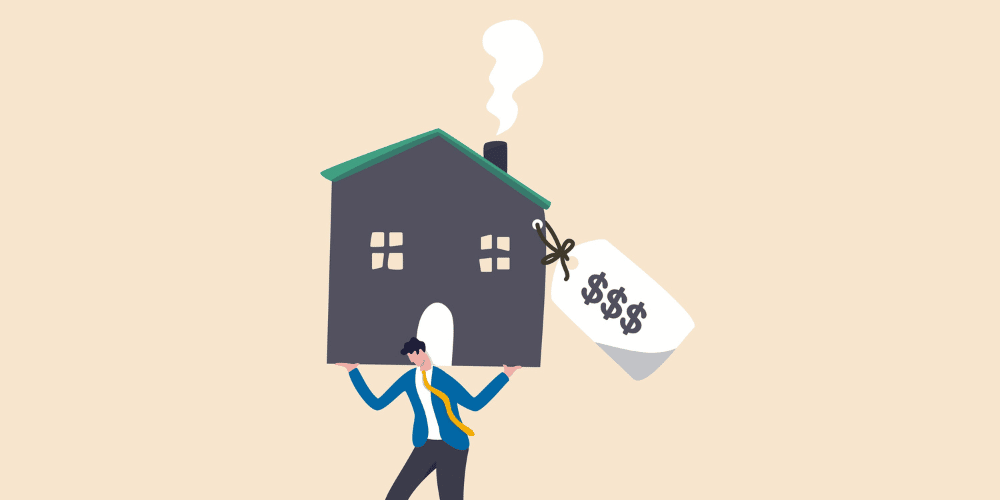
Published
Buy a foreclosed home | Buy a short sale | Low down payment mortgage | Down payment assistance | HUD home buying program | Buy a fixer-upper | FAQs
With the median home value sitting at a whopping $357,810, and 34.5% of potential home buyers reporting budget challenges, many home buyers are researching how to buy a house cheap.
Key takeaways
- The cheapest way to buy a home is to buy a “distressed property,” like a foreclosure or a short sale.
- First-time or low-income buyers can get down payment and closing cost assistance through various government programs.
- You can find realtors who specialize in low-cost purchases.
Foreclosed or short sale homes often sell below market values, making them the cheapest options, but they come with risks, such as poor condition or a longer closing process.
For a less risky option, you could lower the down payment requirement on a mortgage by taking out a government-backed loan, like a VA, FHA, or USDA. You could also buy a fixer-upper, or apply for special funding through numerous government assistance programs.
» MORE: 20 Ways to Save Money When Buying a Home
Buy a foreclosed home
Foreclosed properties have been repossessed by banks or lenders, usually because the original owners stopped paying their mortgages. Banks are highly motivated to offload these homes as quickly as possible, often selling them below market value — making foreclosures an affordable option.
But they’re cheap for a reason: the bank or lender will sell foreclosed-on home “as is,” leaving you responsible for all repairs.
Plus, banks usually sell foreclosures for cash, not wanting to risk another foreclosure. Buying with a mortgage would likely be an extra long and involved process.
🔍 How to find foreclosures:
- Search specialty websites, such as HomePath.com or Foreclosure.com
- Scout public listing sites for bank-owned properties
- Enlist a realtor specialized in foreclosures
Buy a short sale
A short sale is a home that sells below what’s still owed on the mortgage. For instance, if the seller owes $250,000 on a mortgage but sells the home for $230,000, then it would be considered a short sale.
You’ll make an offer to the seller’s bank, not the seller, which typically asks for around 85% of the home’s appraised value. Some banks will accept offers as low as 50%, though.
Many short sale homes are sold “as is,” which could be more cost efficient for lenders than going through a foreclosure process. Plus, closing on a short sale can be painstakingly slow, and you might also get stiff resistance from the seller’s bank, so a short sale is best if you aren’t in a rush.
🔍 How to find short sales:
- Search websites like Zillow
- Ask your city or county clerk’s office for a list of pre-foreclosures
- Enlist a realtor specialized in short sales
Use a low down payment mortgage
Government-backed loans can make buying a home easier by lowering upfront requirements for buyers, though homeowners may have higher monthly mortgage payments.
Mortgages from the Federal Housing Administration (FHA) require low down payments, while the U.S. Departments of Agriculture (USDA) and Veterans Affairs (VA) could waive the down payment altogether.
FHA loan
The FHA also offers closing cost assistance, or you can use gift money to fund your full down payment.
General requirements: 580 credit score, 3.5% down payment (or 500 score with a 10% down payment), and a 43% debt-to-income ratio.
USDA loan
USDA loans are no-down payment mortgages for houses or properties in rural areas.
General requirements: 640 credit score, 41% debt-to-income ratio, designated rural area, and local income limits. Some lenders may accept lower scores or higher DTIs with certain compensating factors.
VA loan
VA loans are no-down payment mortgages available to current and former service members of the U.S. military, as well as surviving spouses.
General requirements: certificate of eligibility (COE), 620 credit score, 41% debt-to-income ratio, 2 years of continuous income, and 2 months of savings or emergency funds.
Use a down payment or closing cost assistance program
Many first-time and low-income home buyers can get help from the local, state, or federal government with covering closing costs or a portion of the down payment.
Grants: gift money that’s provided at closing. You won’t have to repay it or get taxed on it.
Second mortgage loans: forgivable loans instead of cash. You won’t have to repay it unless you move out or refinance within a certain time frame.
HUD programs
The U.S. Department of Housing and Urban Development (HUD) sponsors its own home-buying assistance programs, such as:
- Good Neighbor Next Door. Eligible buyers (e.g., public servants, emergency first responders, teachers) can buy HUD-approved homes at a deep discount — often 50% off the list price.
- Housing Choice Voucher (HCV) Homeownership Program. Low-income families get help paying for monthly housing expenses.
Buy a fixer-upper
Buying a fixer-upper, or a home in need of serious cosmetic repairs, gives you a couple advantages: lower costs up front and faster equity.
You can invest in the home over time — instead of immediately — either yourself or by hiring a professional.
You can build equity (your level of homeownership) faster. Because a house’s market value tends to go up with an improved appearance and structure, fixing it up can raise your equity, too.
Some government programs will even help you fund your fixer-upper. The FHA 203(k) mortgage, for example, could let you roll the purchase and repair costs into one loan.
Other ways to buy a cheap house
Buy less house. Figure out how much home you can afford, then go house-hunting in that price range.
Move to a more affordable city. If you’re flexible with where you live, you could very well find a good home in another city without downsizing.
FAQs
How can I buy a house with no money?
You can qualify for no down payment financing through VA loans and USDA loans or through a local down payment or closing cost assistance program. Some buyers can also qualify for a HUD special home buying program.
How much money should I save before buying a house?
First, figure out a price range. From there, you can estimate a down payment (3.5–20% of the home value), earnest money payment (1–3%), and closing costs (3–5%).
What credit score do I need to buy a house with no money down?
You need a credit score around 620–640 to qualify for a no down payment loan from the VA or USDA.
Related reading
Millennial Home Buyer Report: 2022 Edition. In a hot market, 90% of millennials would buy a home sight unseen and make rash decisions to afford a home.
How to Choose a Realtor: Expert Secrets. We talked to the pros to learn the best way to choose a realtor when buying or selling a home.
What Is a Buyer’s Agent and Do I Really Need One? A buyer’s agent is a real estate agent who represents a home buyer. Learn more about what to expect.


Leave a Reply